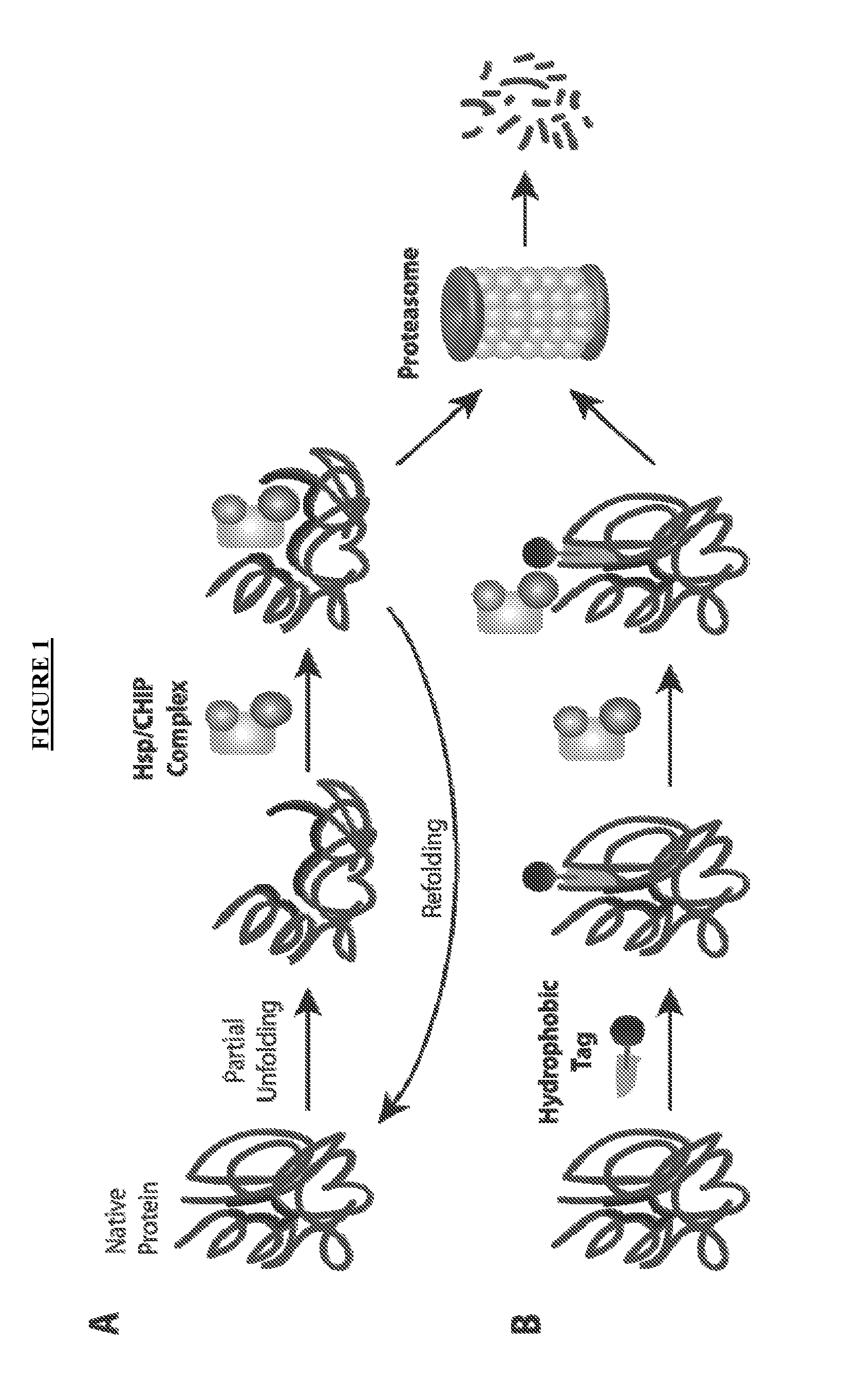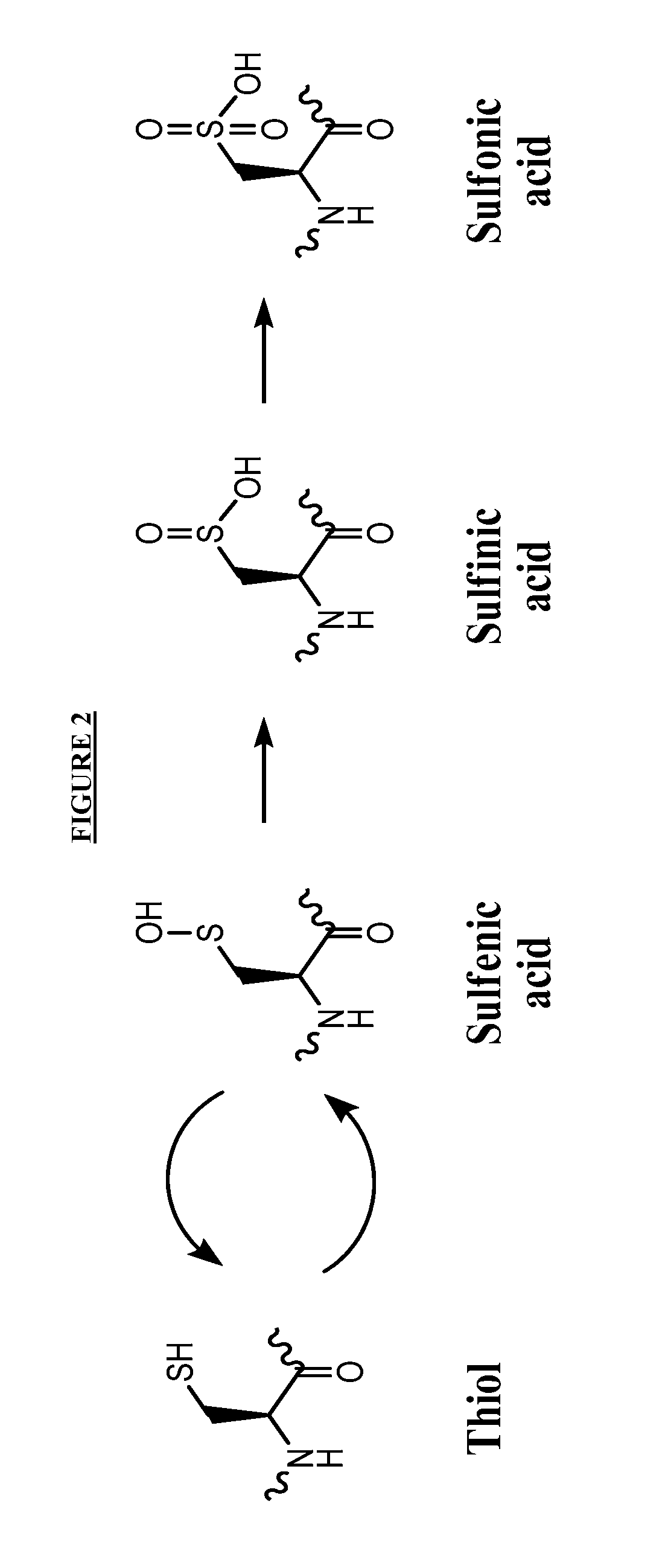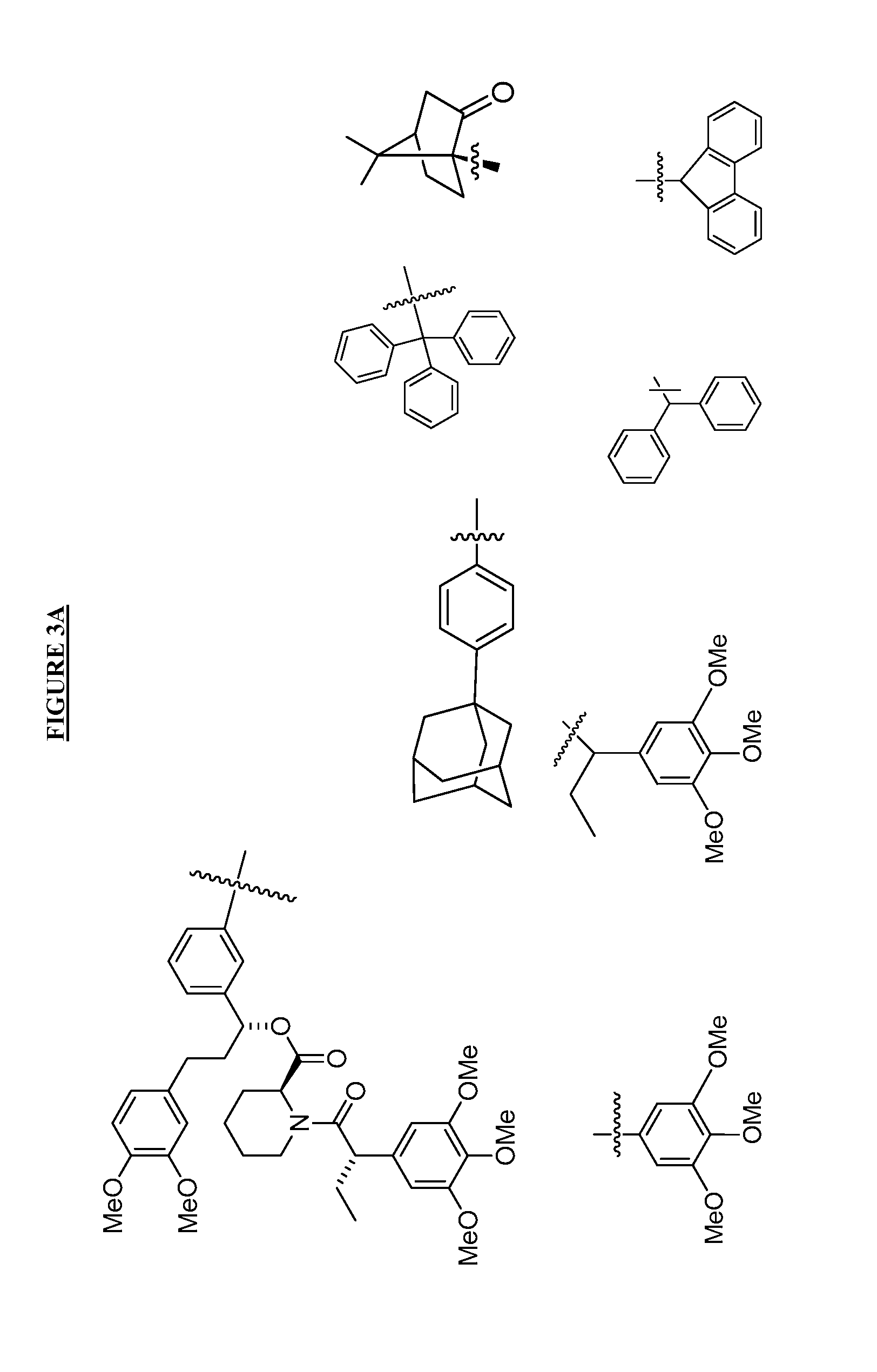Compounds useful for promoting protein degradation and methods using same
- Summary
- Abstract
- Description
- Claims
- Application Information
AI Technical Summary
Benefits of technology
Problems solved by technology
Method used
Image
Examples
example 1
4-(3-(4-Cyano-3-(trifluoromethyl)phenyl)-5,5-dimethyl-4-oxo-2-thioxoimidazolidin-1-yl)butanoic acid (Ru-Acid)
[0444]
[0445]RU59063 (4-[3-(4-hydroxybutyl)-4,4-dimethyl-5-oxo-2-thioxoimidazolidin-1-yl]-2-(trifluoromethyl)benzonitrile; 145 mg, 0.38 mmol) was dissolved in 2 mL DMF and charged with PDC (1.4 g, 3.7 mmol) and stirred for 48 hours, and then the mixture was quenched with 10 mL 1 M HCl and extracted into Et2O (5×25 mL). The combined organic layers were washed with brine (1×100 mL), dried with Na2SO4 and concentrated down to yield 135 mg (90% yield) pure product. 1H NMR (300 MHz, CDCl3) δ 7.94 (d, J=8.3, 1H), 7.88 (s, 1H), 7.77 (d, J=8.2, 1H), 3.82-3.65 (m, 2H), 2.50 (s, 2H), 2.14 (s, 2H), 1.59 (s, 6H); 13C NMR (126 MHz, CDCl3) δ 178.6, 177.4, 175.3, 175.2, 137.1, 135.2, 133.5 (q, J=32.1), 132.1, 127.0 (q, J=4.7), 121.8 (q, J=276.2), 114.9, 110.1, 65.2, 43.3, 31.7, 23.1; LRMS (ESI) 421.2 (M+Na)+.
example 2
2-(Adamantan-1-yl)-N-(2-(2-aminoethoxyl)ethyl) acetamide
[0446]
[0447]To a round bottom flask with stirbar was charged 1-adamantaneacetic acid (1.0 g, 9.7 mmol), EDC (1.43 g, 7.5 mmol), HOBt (1.16 g, 7.5 mmol), and 20 mL dichloromethane. After 15 minutes of stirring diamine (1.1 g, 10.0 mmol) was added and the mixture left stir for 16 h upon which the mixture was diluted with 30 mL dichloromethane and washed with saturated Na2CO3 (2×50 mL). The organic layer was dried with Na2SO4 and concentrated down to yield a crude oil that was purified by silica gel chromatography (dichloromethane to 4:1 dichloromethane:MeOH (0.5 N NH3)) to yield 520 mg (35% yield) of pure product as an amber oil. 1H NMR (300 MHz, CDCl3) δ 3.50-3.33 (m, 8H), 2.78 (t, J=5.1, 2H), 1.95-1.85 (m, 6H), 1.65-1.45 (m, 9H); 13C NMR (75 MHz, CDCl3) δ 171.1, 77.3, 72.7, 69.7, 51.4, 42.5, 38.9, 36.7, 32.6, 28.6; LRMS (ESI) 281.3 (M+H)+.
example 3
2-(2-(2-(2-(Adamantan-1-yloxy)ethoxy)ethoxy)ethoxy) ethanamine
2-(2-(2-(2-(Adamantan-1-yl-oxy)ethoxy)ethoxy)ethoxy)ethanol
[0448]
[0449]To a round bottom flask with stirbar was charged 2-(2-(2-(2-hydroxy-ethoxy)ethoxy)ethoxy)ethanol (4.5 g, 23.3 mmol), 1-bromoadamantane (1.0 g, 4.6 mmol), Et3N (2.1 mL 15.0 mmol) and DBU (0.033 mL, 0.23 mmol). Upon stirring at 110° C. for 18 h the reaction was diluted with 25 mL 1 M aq. HCl and extracted in to dichloromethane (2×25 mL). The organic layer was washed with water (2×25 mL) and dried with Na2SO4 to yield a crude oil. Column chromatography (4:1 Hex:EtOAc to 100% EtOAc) led to the isolation of 202 mg (30% yield) pure product. 1H NMR (500 MHz, CDCl3) δ 3.69-3.63 (m, 2H), 3.62-3.57 (m, 8H), 3.56-3.46 (m, 6H), 3.30 (s, 1H), 2.07 (s, 3H), 1.76-1.62 (m, 6H), 1.54 (q, J=12.2, 6H); 13C NMR (126 MHz, CDCl3) δ 73.0, 72.6, 71.5, 70.9, 70.9, 70.9, 70.6, 61.9, 59.6, 41.7, 36.8, 30.8; LRMS (ESI) 329.5 (M+H)+.
2-(2-(2-(2-(Adamantan-1-yloxy)ethoxy)ethoxy)etho...
PUM
| Property | Measurement | Unit |
|---|---|---|
| Length | aaaaa | aaaaa |
| Stress optical coefficient | aaaaa | aaaaa |
| Degradation properties | aaaaa | aaaaa |
Abstract
Description
Claims
Application Information
 Login to View More
Login to View More - R&D
- Intellectual Property
- Life Sciences
- Materials
- Tech Scout
- Unparalleled Data Quality
- Higher Quality Content
- 60% Fewer Hallucinations
Browse by: Latest US Patents, China's latest patents, Technical Efficacy Thesaurus, Application Domain, Technology Topic, Popular Technical Reports.
© 2025 PatSnap. All rights reserved.Legal|Privacy policy|Modern Slavery Act Transparency Statement|Sitemap|About US| Contact US: help@patsnap.com



